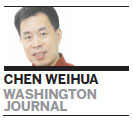
It was a two-day forum on South China Sea held July 10-11 at the Center for Strategic and International Studies (CSIS) in Washington. The speakers, many from the United States, Japan, Vietnam and the Philippines, pointed fingers at China for being "provocative", "aggressive," "coercive" and "changing the status quo".
Chu Shulong, a professor of political science and international relations from Beijing-based Tsinghua University, felt unease.
He pointed out that the US pivot to Asia-Pacific policy has intentionally and unintentionally helped escalate tensions in the South China Sea.
"The simple fact is that tension in the South China Sea has become higher in the last three years since US adopted its pivot strategy, especially since Secretary (of State) (Hillary) Clinton's Hanoi speech in July 2010," Chu said.
His thoughts are widely shared among the Chinese population, who largely see the US as biased in its role in both South and East China seas. Many believe the US is trying to profit to advance its dominance in the region.
Chu, a well-respected intellectual, has spent three decades studying US foreign policy. He said that the previous US Democratic administration under President Bill Clinton had emphasized three pillars in China policy: economic interest, democracy and human rights.
"But from the pivot strategy in the last few years, we hear too much talk about security, we don't hear much talk about democracy, human rights issues or economic development and cooperation," he told the audience.
Chu not only believes the US is behind much of the tension in South and East China seas, he said the US strategy is also unbalanced, unreasonable and biased.
For one thing, in the two-day CSIS conference, no US officials present talked about anything wrong done by other countries, except China, Chu pointed out.
Examples Chu cited included that when the Philippines sent large military vessels to the Huangyan Island in the South China Sea, the US kept silent, and when Vietnam passed unilateral law to change the status quo, the US government again said nothing.
Pointing to the big projector screen on the wall at the CSIS conference room, Chu said all the pictures in the presentations were about construction done by China, not by other countries on the rocks and reefs.
"We never see here the picture of construction by others, so this is great bias, unreasonable and unfair treatment that China cannot accept," he said.
In fact, when visiting Japanese Defense Minister Itsunori Onodera spoke at CSIS on July 11, he also repeatedly used harsh words to blame China for allegedly threatening to change the status quo by force and coercion, but never mentioned or even tried to justify the Japanese government's nationalization of the Diaoyu Islands in late 2012. Most Chinese believe the nationalization caused the current tensions by changing the status quo since the 1970s and 1980s when the two governments decided to shelve the historical maritime territorial disputes for future generation.
The US has also chosen to keep silent on the unilateral and provocative Japanese action, reinforcing the idea among many Chinese that the US is biased in its policy in the region to favor its military allies.
While international law was one of the key words at the conference, Chu pointed out the irony of the US. He admitted that China has a long way to go in building the rule of law, but said the US is in no position to talk about this because it has not participated in many international laws, such as the International Criminal Court, the United Nations Convention on the Law of the Sea and some international conventions on human rights.
"So the US is just talking about international law to require others when it's needed, but feel free when it does not need international law for itself," Chu said, citing the example of the Iraq war.
To Chu, it does not make sense for the US to accuse China of threatening the use of force or coercion when the US is increasing its military presence in the South China Sea. "What we should call this? It's also threatening the use of force, it's also coercion."
The bespectacled political science professor, speaking English in his slow and soft voice, reminded the audience that in the last 20 years it was the US which most often used military force and coercion in the world.
He said that unlike what many US officials and academics think, President Xi Jinping's foreign policy is not a departure from previous Chinese leaders but basically a continuation.
Chu might have looked a bit lonely among the panelists at CSIS last week, but some US pundits, including Bonnie Glaser, a CSIS senior adviser for Asia who has been critical of China on the South China Sea issue, had to admit that the Chinese government policy on South China and East China seas enjoyed wide support among the Chinese people.
Contact the writer at chenweihua@chinadailyusa.com
(China Daily USA?07/15/2014 page2)
